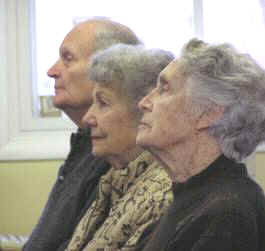|
|
Many Seniors are at Risk of
Running Out of Money
Minneapolis Star Tribune
March 31, 2005

More than half a million Minnesotans nearing retirement age are at "very high risk" of running out of money during their retirement years, creating a possible avalanche of demands for public assistance, a team of University of Minnesota researchers reported during a legislative hearing at the Capitol in St. Paul Wednesday.
The head of the research team from the university's School of Public Health described the numbers as "startling but conservative." The chairwoman of a Senate committee called it "alarming."
Solutions will require Minnesotans to save more and will force state officials to find creative ways to meet the rising demands for help.
What the study said:
One in every four Minnesotans who are between the age of 40 and 69 today appear likely to come up short of money needed to pay for medical treatment and long-term care. About 550,000 people are considered at "very high risk," and another 330,000 at "moderate to high risk."
Who's at greatest risk?
Single women.
Why did the state commission the study?
Because all of us stand at risk of having to pay more in taxes and fees to help those who can't afford care.
What's causing the problem?
Changes in our own lives cause some of it. People are living longer. They're having fewer kids who could help care for them in their old age. They're having kids later in life, leading to competition between retirement accounts and college bills. Companies are tightening pension plans, making them less generous.
How did legislators react?
Republicans: Sen. Brian LeClair, a Republican insurance executive from Woodbury, said the message to citizens needs to be ultraclear, that Medicaid can't possibly handle the approaching avalanche of demands. "If there's a notion that people can be covered, nothing will change," he said.
DFLers: Sen. Becky Lourey, an activist from Kerrick, pointed to the growing number of people whose wages already are too stretched to allow for retirement savings.
How about outside experts?
Their main caution is that these estimates are likely to lowball the potential problem. They assume a much higher rate of savings, for instance, than people are managing today. The university researchers agreed, saying they simply couldn't, for technical reasons, construct a model they consider realistic.
What happens next?
Possible solutions include: Public awareness campaigns urging greater savings. Long-term-care insurance, perhaps subsidized with tax credits. Reverse mortgages, allowing people with equity in homes to draw on that to pay bills. Loans for the needy instead of outright assistance. A report on that front may be issued as soon as next month.
Where can I find out more?
Go to the state's Human Services home page (www.dhs.state.mn.us) and look for the headline "Report calls for increased private funding of long-term care."
|
|



